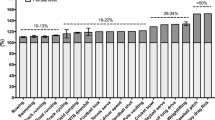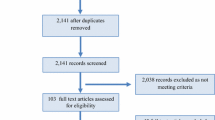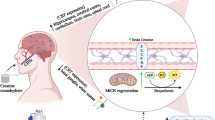Abstract
Purpose
The aim of this study was to systematically review evidence on the prevalence and magnitude of side effects associated with caffeine supplementation in athletes.
Methods
Systematic searches through the PubMed, VHL, Scopus, and Web of Science databases were conducted according to the PRISMA guidelines. Peer-reviewed articles written in English that reported the prevalence/percentage or magnitude/effect size of side effects after caffeine supplementation in athletes in a sports context were included. Studies were grouped by the dose of caffeine administered as follows: low = ≤ 3.0 mg/kg; moderate = from 3.1 to 6.0 mg/kg; high = ≥ 6.1 mg/kg. The magnitude of the side effects was calculated with effect sizes.
Results
The search retrieved 25 studies that met the inclusion/exclusion criteria with a pooled sample of 421 participants. The supplementation with caffeine produced a higher prevalence or magnitude of all side effects under investigation when compared to placebo/control situations. The prevalence (magnitude) was between 6 and 34% (ES between 0.13 and 1.11) for low doses of caffeine, between 0 and 34% (ES between −0.13 and 1.20) for moderate doses of caffeine, and between 8 and 83% (ES between 0.04 and 1.52) with high doses of caffeine. The presence of tachycardia/heart palpitations and the negative effects on sleep onset had the highest prevalence and magnitude, in athletes using supplementation with caffeine.
Conclusion
In summary, caffeine supplementation in the doses habitually used to enhance physical performance produces several side effects, both after exercise and at least 24 h after the ingestion. However, the prevalence and magnitude of side effects with high doses of caffeine were habitually higher than with low doses of caffeine. From a practical perspective, using ~3.0 mg/kg of caffeine may be the dose of choice to obtain the ergogenic benefits of caffeine with the lowest prevalence and magnitude of side effects.



Similar content being viewed by others
Availability of data and materials
After publication, all data necessary to understand and assess the conclusions of the manuscript are available to any reader of the European Journal of Nutrition.
References
Nawrot P, Jordan S, Eastwood J et al (2003) Effects of caffeine on human health. Food Addit Contam 20:1–30
Heckman MA, Weil J, Gonzalez de Mejia E (2010) Caffeine (1, 3, 7-trimethylxanthine) in foods: a comprehensive review on consumption, functionality, safety, and regulatory matters. J Food Sci 75:R77-87
Fulgoni VL, Keast DR, Lieberman HR (2015) Trends in intake and sources of caffeine in the diets of US adults: 2001–2010. Am J Clin Nutr 101:1081–1087
Del Coso J, Muñoz G, Muñoz-Guerra J (2011) Prevalence of caffeine use in elite athletes following its removal from the World Anti-Doping Agency list of banned substances. Appl Physiol Nutr Metab 36:555–561
Van Thuyne W, Roels K, Delbeke FT (2005) Distribution of caffeine levels in urine in different sports in relation to doping control. Int J Sports Med 26:714–718
Aguilar-Navarro M, Muñoz G, Salinero JJ et al (2019) Urine caffeine concentration in doping control samples from 2004 to 2015. Nutrients 11:286
Desbrow B, Leveritt M (2006) Awareness and use of caffeine by athletes competing at the 2005 Ironman Triathlon World Championships. Int J Sports Nutr Exerc Metab 16:545–558
Chester N, Wojek N (2008) Caffeine consumption among British athletes following changes to the 2004 WADA prohibited list. Int J Sports Med 29:524–528
Kendall KL, Moon JR, Fairman CM et al (2014) Ingesting a preworkout supplement containing caffeine, creatine, β-alanine, amino acids, and B vitamins for 28 days is both safe and efficacious in recreationally active men. Nutr Res 34:442–449
Salinero JJ, Lara B, Abian-Vicen J et al (2014) The use of energy drinks in sport: perceived ergogenicity and side effects in male and female athletes. Br J Nutr 112:1494–1502
Grgic J (2018) Caffeine ingestion enhances Wingate performance: a meta-analysis. Eur J Sport Sci 18:219–225
Salinero JJ, Lara B, Del Coso J (2019) Effects of acute ingestion of caffeine on team sports performance: a systematic review and meta-analysis. Res Sports Med 27:238–256
Grgic J, Grgic I, Pickering C et al (2020) Wake up and smell the coffee: caffeine supplementation and exercise performance - an umbrella review of 21 published meta-analyses. Br J Sports Med 54:681–688
Martins GL, Guilherme JPLF, Ferreira LHB et al (2020) Caffeine and exercise performance: possible directions for definitive findings. Front Sports Act Living. 2:574854
Guest NS, Van Dusseldorp TA, Nelson MT et al (2021) International society of sports nutrition position stand: caffeine and exercise performance. J Int Soc Sports Nutr 18:1
Shen JG, Brooks MB, Cincotta J et al (2019) Establishing a relationship between the effect of caffeine and duration of endurance athletic time trial events: a systematic review and meta-analysis. J Sci Med Sport 22:232–238
Southward K, Rutherfurd-Markwick KJ, Ali A (2018) Correction to: the effect of acute caffeine ingestion on endurance performance: a systematic review and meta-analysis. Sports Med 48:2425–41 (Erratum for: Sports Med 48 1913 1928)
Polito MD, Souza DB, Casonatto J et al (2016) Acute effect of caffeine consumption on isotonic muscular strength and endurance: a systematic review and meta-analysis. Sci Sports 31:119–128
Grgic J, Pickering C (2019) The effects of caffeine ingestion on isokinetic muscular strength: a meta-analysis. J Sci Med Sport 22:353–360
Raya-González J, Rendo-Urteaga T, Domínguez R et al (2020) Acute effects of caffeine supplementation on movement velocity in resistance exercise: a systematic review and meta-analysis. Sports Med 50:717–729
Sökmen B, Armstrong LE, Kraemer WJ et al (2008) Caffeine use in sports: considerations for the athlete. J Strength Cond Res 22:978–986
Spriet LL (2014) Exercise and sport performance with low doses of caffeine. Sports Med 44:S175–S184
Poussel M, Kimmoun A, Levy B et al (2013) Fatal cardiac arrhythmia following voluntary caffeine overdose in an amateur body-builder athlete. Int J Cardiol 166:e41–e42
Willson C (2018) The clinical toxicology of caffeine: a review and case study. Toxicol Rep 5:1140–1152
Wikoff D, Welsh BT, Henderson R et al (2017) Systematic review of the potential adverse effects of caffeine consumption in healthy adults, pregnant women, adolescents, and children. Food Chem Toxicol 109:585–648
Higdon JV, Frei B (2006) Coffee and health: a review of recent human research. Crit Rev Food Sci Nutr 46:101–123
Pallarés JG, Fernández-Elías VE, Ortega JF et al (2013) Neuromuscular responses to incremental caffeine doses: performance and side effects. Med Sci Sports Exerc 45:2184–2192
Moher D, Liberati A, Tetzlaff J et al (2009) Preferred reporting ítems for systematic reviews and meta-analyses: the PRISMA statement. PLoS Med 6:e1000097
Munn Z, Stern C, Aromataris E et al (2018) What kind of systematic review should I conduct? A proposed typology and guidance for systematic reviewers in the medical and health sciences. BMC Med Res Methodol 18:5
Saw AE, Main LC, Gastin PB (2016) Monitoring the athlete training response: subjective self-reported measures trump commonly used objective measures: a systematic review. Br J Sports Med 50:281–291
Claudino JG, Capanema DO, de Souza TV et al (2019) Current approaches to the use of Artificial Intelligence for injury risk assessment and performance prediction in team sports: a systematic review. Sports Med Open 5:28
Claudino JG, Cardoso Filho CA, Bittencourt NFN et al (2021) Eccentric strength assessment of hamstring muscles with new technologies: a systematic review of current methods and clinical implications. Sports Med Open 7:10
Claudino JG, Cardoso Filho CA, Boullosa D et al (2021) The role of veracity on the load monitoring of professional soccer players: a systematic review in the face of the Big Data era. Appl Sci 11:6479
Graham TE, Spriet LL (1995) Metabolic, catecholamine, and exercise performance responses tovarious doses ofcaffeine. J Appl Physiol 78:867–874
Cohen J (1988) Statistical power analysis for the behavioral sciences. Lawrence Erlbaum, Hillsdale, NJ
Robertson S, Bartlett JD, Gastin PB (2017) Red, amber, or green? Athlete monitoring in team sport: the need for decision-support systems. Int J Sports Physiol Perform 12:S273–S279
Negaresh R, Del Coso J, Mokhtarzade M et al (2019) Effects of different dosages of caffeine administration on wrestling performance during a simulated tournament. Eur J Sport Sci 19:499–507
Kilding AE, Overton C, Gleave J (2012) Effects of caffeine, sodium bicarbonate, and their combined ingestion on high-intensity cycling performance. Int J Sport Nutr Exerc Metab 22:175–183
Lara B, Gonzalez-Millán C, Salinero JJ et al (2014) Caffeine-containing energy drink improves physical performance in female soccer players. Amino Acids 46:1385–1392
Lee CL, Cheng CF, Astorino TA et al (2014) Effects of carbohydrate combined with caffeine on repeated sprint cycling and agility performance in female athletes. J Int Soc Sports Nutr 11:17
Ali A, O’Donnell JM, Starck C et al (2015) The effect of caffeine ingestion during evening exercise on subsequent sleep quality in females. Int J Sports Med 36:433–439
Lara B, Ruiz-Vicente D, Areces F et al (2015) Acute consumption of a caffeinated energy drink enhances aspects of performance in sprint swimmers. Br J Nutr 114:908–914
Lopes-Silva JP, Silva Santos JF, Branco BH et al (2015) Caffeine ingestion increases estimated glycolytic metabolism during Taekwondo combat simulation but does not improve performance or parasympathetic reactivation. PLoS One 10:e0142078
Quinlivan A, Irwin C, Grant GD et al (2015) The effects of Red Bull energy drink compared with caffeine on cycling time-trial performance. Int J Sports Physiol Perform 10:897–901
Del Coso J, Portillo J, Salinero JJ et al (2016) Caffeinated energy drinks improve high-speed running in elite field hockey players. Int J Sport Nutr Exerc Metab 26:26–32
Diaz-Lara FJ, Del Coso J, García JM et al (2016) Caffeine improves muscular performance in elite Brazilian Jiu-jitsu athletes. Eur J Sport Sci 16:1079–1086
Hernández-Camacho JD, Vázquez-Carrión J, Fuentes-Lorca E et al (2017) Caffeine supplementation improves countermovement jump in youth soccer players: a pilot study. Rev Esp Nutr Hum Diet 21:155–163
Puente C, Abián-Vicén J, Salinero JJ et al (2017) Caffeine improves basketball performance in experienced basketball players. Nutrients 9:1033
Dunican IC, Higgins CC, Jones MJ et al (2018) Caffeine use in a Super Rugby game and its relationship to post-game sleep. Eur J Sport Sci 18:513–523
Puente C, Abián-Vicén J, Del Coso J et al (2018) The CYP1A2 -163C>A polymorphism does not alter the effects of caffeine on basketball performance. PLoS One 13:e0195943
Zbinden-Foncea H, Rada I, Gomez J et al (2018) Effects of caffeine on countermovement-jump performance variables in elite male volleyball players. Int J Sports Physiol Perform 13:145–150
Fogaça LJ, Santos SL, Soares RC et al (2020) Effect of caffeine supplementation on exercise performance, power, markers of muscle damage, and perceived exertion in trained CrossFit men: a randomized, double-blind, placebo-controlled crossover trial. J Sports Med Phys Fitness 60:181–188
Muñoz A, López-Samanes Á, Pérez-López A et al (2020) Effects of caffeine ingestion on physical performance in elite women handball players: a randomized, controlled study. Int J Sports Physiol Perform 15:1406–1413
Ramos-Campo DJ, Pérez A, Ávila-Gandía V et al (2019) Impact of caffeine intake on 800-m running performance and sleep quality in trained runners. Nutrients 11:2040
Stojanović E, Stojiljković N, Scanlan AT et al (2019) Acute caffeine supplementation promotes small to moderate improvements in performance tests indicative of in-game success in professional female basketball players. Appl Physiol Nutr Metab 44:849–856
Wilk M, Filip A, Krzysztofik M et al (2019) The acute effect of various doses of caffeine on power output and velocity during the bench press exercise among athletes habitually using caffeine. Nutrients 11:1465
Wilk M, Krzysztofik M, Filip A et al (2019) (2019b) The effects of high doses of caffeine on maximal strength and muscular endurance in athletes habituated to caffeine. Nutrients. 11:1912 (Erratum in: Nutrients. 11:2660)
Lavoué C, Siracusa J, Chalchat E et al (2020) Analysis of food and fluid intake in elite ultra-endurance runners during a 24-h World Championship. J Int Soc Sports Nutr 17:36
López-Samanes Á, Moreno-Pérez V, Travassos B et al (2021) Effects of acute caffeine ingestion on futsal performance in sub-elite players. Eur J Nutr. https://doi.org/10.1007/s00394-021-02617-w
Raya-González J, Scanlan AT, Soto-Célix M et al (2021) Caffeine ingestion improves performance during fitness tests but does not alter activity during simulated games in professional basketball players. Int J Sports Physiol Perform 16:387–394
Zylber-Katz E, Granit L, Levy M (1984) Relationship between caffeine concentrations in plasma and saliva. Clin Pharmacol Ther 36:133–137
Desbrow B, Leveritt M (2007) Well-trained endurance athletes’ knowledge, insight, and experience of caffeine use. Int J Sport Nutr Exerc Metab 17(4):328–339
Lima-Silva AE, Cristina-Souza G, Silva-Cavalcante MD et al (2021) Caffeine during high-intensity whole-body exercise: an integrative approach beyond the central nervous system. Nutrients 13:2503
Pickering C, Kiely J (2018) Are the current guidelines on caffeine use in sport optimal for everyone? Inter-individual variation in caffeine ergogenicity, and a move towards personalised sports nutrition. Sports Med 48:7–16
Burke LM (2008) Caffeine and sports performance. Appl Physiol Nutr Metab 33:1319–1334
Drake C, Roehrs T, Shambroom J et al (2013) Caffeine effects on sleep taken 0, 3, or 6 hours before going to bed. J Clin Sleep Med 9:1195–1200
Del Coso J, Salinero JJ, González-Millán C et al (2012) Dose response effects of a caffeine-containing energy drink on muscle performance: a repeated measures design. J Int Soc Sports Nutr 9:21
Pasman WJ, van Baak MA, Jeukendrup AE et al (1995) The effect of different dosages of caffeine on endurance performance time. Int J Sports Med 16:225–230
Filip A, Wilk M, Krzysztofik M et al (2020) Inconsistency in the ergogenic effect of caffeine in athletes who regularly consume caffeine: is it due to the disparity in the criteria that defines habitual caffeine intake? Nutrients 12:1087
Nehlig A (2018) Interindividual differences in caffeine metabolism and factors driving caffeine consumption. Pharmacol Rev 70:384–411
Soares RN, Schneider A, Valle SC et al (2018) The influence of CYP1A2 genotype in the blood pressure response to caffeine ingestion is affected by physical activity status and caffeine consumption level. Vascul Pharmacol 106:67–73
Grgic J, Pickering C, Del Coso J et al (2021) CYP1A2 genotype and acute ergogenic effects of caffeine intake on exercise performance: a systematic review. Eur J Nutr 60:1181–1195
Davis JM, Zhao Z, Stock HS et al (2003) Central nervous system effects of caffeine and adenosine on fatigue. Am J Physiol Regul Integr Comp Physiol 284:R399-404
Byrne EM, Johnson J, McRae AF et al (2012) A genome-wide association study of caffeine-related sleep disturbance: confirmation of a role for a common variant in the adenosine receptor. Sleep 35:967–975
Simim MAM, Souza HS, Cardoso Filho CA et al (2020) Sleep quality monitoring in individual sports athletes: parameters and definitions by systematic review. Sleep Sci 13:267–285
Parrott AC, Hindmarch I (1980) The Leeds Sleep Evaluation Questionnaire in psychopharmacological investigations - a review. Psychopharmacology 71:173–179
Stuart GR, Hopkins WG, Cook C et al (2005) Multiple effects of caffeine on simulated high-intensity team-sport performance. Med Sci Sports Exerc 37:1998–2005
Felippe LC, Lopes-Silva JP, Bertuzzi R et al (2016) Separate and combined effects of caffeine and sodium-bicarbonate intake on judo performance. Int J Sports Physiol Perform 11:221–226
Akerstedt T, Hume K, Minors D et al (1994) The subjective meaning of good sleep, an intraindividual approach using the Karolinska Sleep Diary. Percept Mot Skills 79:287–296
Acknowledgements
We would like to thank the authors of cited articles who collaborated to obtain the data.
Funding
No sources of funding were used to assist in the design, collection, analysis, and interpretation of data, or in writing of this manuscript.
Author information
Authors and Affiliations
Contributions
JGS: design, collection, analysis, interpretation of data, and writing up the paper. JDC: design, analysis, interpretation of data, and writing up the paper. FSF: design, collection, analysis, interpretation of data, and writing up the paper. BVCS: design, collection, analysis, interpretation of data, and writing up the paper. DBS: analysis, interpretation of data, and writing up the paper. RLSG: collection, analysis, interpretation of data. AFS: analysis, interpretation of data, and writing up the paper. JCS: design, analysis, interpretation of data, and writing up the paper. JGC: design, collection, analysis, interpretation of data, and writing up the paper.
Corresponding author
Ethics declarations
Conflict of interests
All authors declare that they have no conflicts of interest relevant to the content of this review.
Ethical approval and consent to participate
Not applicable.
Consent for publication
All authors consent to the publication of the manuscript.
Supplementary Information
Below is the link to the electronic supplementary material.
Rights and permissions
About this article
Cite this article
de Souza, J.G., Del Coso, J., Fonseca, F.d. et al. Risk or benefit? Side effects of caffeine supplementation in sport: a systematic review. Eur J Nutr 61, 3823–3834 (2022). https://doi.org/10.1007/s00394-022-02874-3
Received:
Accepted:
Published:
Issue Date:
DOI: https://doi.org/10.1007/s00394-022-02874-3




